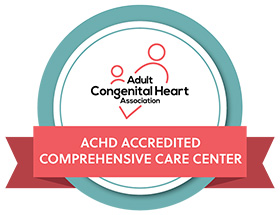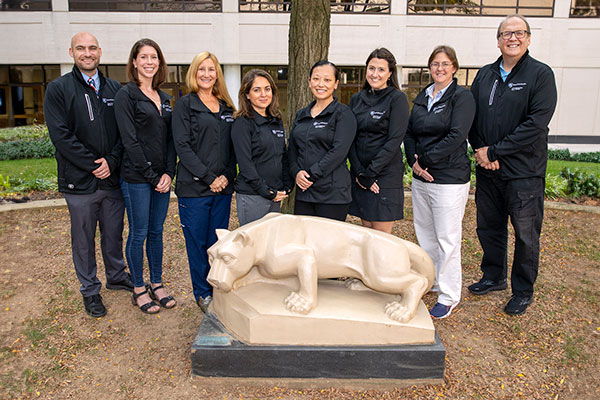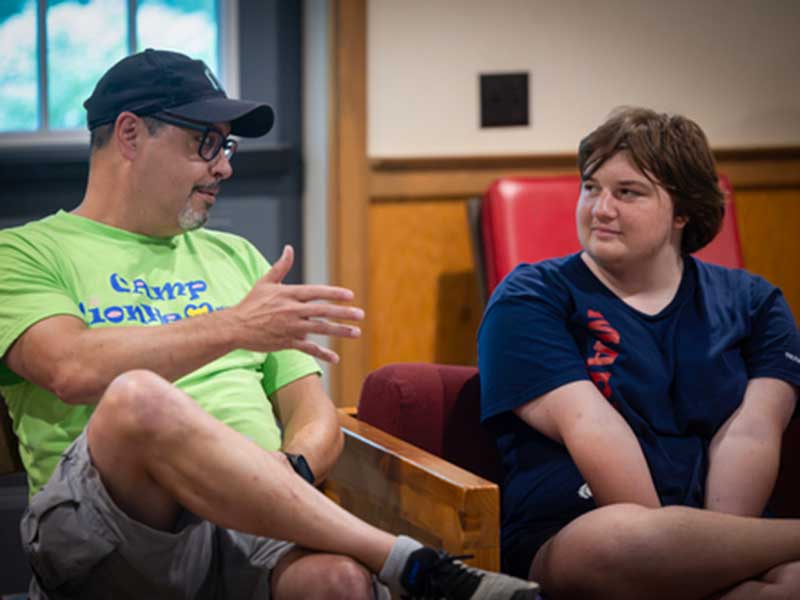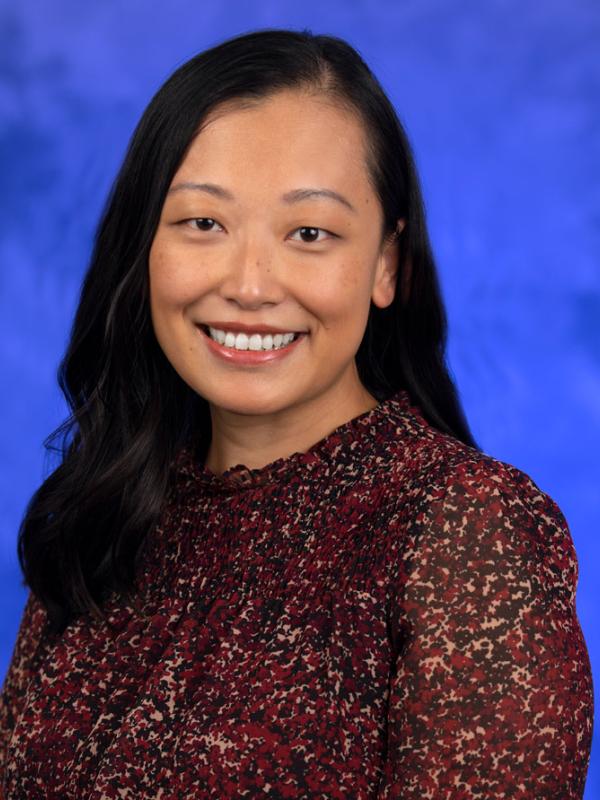Experienced adult congenital heart disease care
The Penn State Health program for adult congenital heart disease (ACHD) has a long history of successfully treating adults who were born with heart defects. Our ACHD cardiologists are skilled in all aspects of ACHD care, including navigating nonsurgical and surgical options for even the most complex cases. The ACHD Program at Penn State Health Milton S. Hershey Medical Center is one of the oldest in the country. It was founded by the late Dr. William Davidson in 1991. We’re part of the Penn State Health Congenital Heart Center, where we treat patients from fetal life to adulthood, all in one location.
A Lifelong Heart Condition Needs Specialized Care
Adult congenital heart disease is a structural problem with your heart that is present when you are born. It is the most common birth defect and can involve the walls and valves of the heart, the coronary arteries that supply blood to the heart or the arteries and veins near the heart. Although called a disease, it is actually an abnormality of the heart that usually needs lifelong follow-up and care.
Types of CHD
- Aortic Valve Stenosis (AVS) - a valve that does not open and closure of a major heart valve
- Atrial Septal Defect (ASD) - a hole in the wall between the top two chambers of the heart
- Coarctation of the Aorta (CoA) - a narrowing of the artery that carries blood to the body
- Complete Atrioventricular Canal defect (CAVC) - a large hole in the center of the heart affecting all four chambers of the heart
- Congenitally corrected transposition of the great arteries
- Transposition of the great arteries - the two arteries carrying blood away from the heart are reversed
- Ebstein's Anomaly - a defect that does not allow a heart valve to close properly
- Patent Ductus Arteriosis (PDA) - a hole in the main artery of the body (aorta)
- Pulmonary Valve Stenosis - a thickened or attached heart valve that doesn’t fully open
- Single Ventricle Defects - a lower chamber of the heart may be smaller, underdeveloped or missing a valve, includes tricuspid, pulmonary atresia and other complex conditions
- Tetralogy of Fallot - a complex defect with a hole between lower chambers, an obstruction from heart to lungs, the main artery to the heart lies over the hole in lower chamber and the muscle around lower right chamber is thickened
- Total Anomalous Pulmonary Venous Connection (TAPVC) - the veins from the lungs lead to the heart in abnormal positions
- Truncus Arteriosus - one larger artery carries blood to the lungs and body, rather than two
- Ventricular Septal Defect (VSD) - a hole in the wall between the lower chambers of the heart
Symptoms, Diagnosis and Outlook
Nearly 1% of babies are born with CHD, most undergo surgery in infancy and childhood, but sometimes there are no signs or symptoms so the defect may not be found until adulthood. Even if it is caught early on, congenital heart disease is, in many ways, a lifelong condition.
Undiscovered CHD in adults can be found because they start noticing symptoms, including:
- Abnormal heartbeats
- Flushing of skin, lips and fingernails
- Shortness of breath
- Fainting
- Fatigue
- Swelling
To diagnose CHD in adults, our team will integrate your history, exam and prior records with an echocardiogram to make a diagnosis. This may lead to further tests, including MRI, CT, cardiac cauterizations, electrophysiologic testing or a transesophageal echo.
Many children with CHD undergo surgery or interventions early in life. These procedures may not fully correct the defect and can lead to additional heart issues later. As adults, those with CHD often require more surgeries, minimally invasive treatments, and medications. Complex conditions like Fontan circulation, systemic right ventricles, and CHD-related complications demand specialized ongoing care. Patients also benefit from support for non-cardiac health issues and tailored obstetric and gynecologic care. Most children with CHD now survive into adulthood, with many leading normal lives, working, marrying and having families. In fact, there are now more adults with CHD in the U.S. than children with CHD.
Why choose Penn State Health for adult congenital heart disease
ACHD patients followed throughout life in specialized care centers like the Penn State Health ACHD Program, have improved longevity. There are currently less than 500 board-certified adult congenital heart disease cardiologists in the United States. We are proud to have six board-eligible/board-certified ACHD cardiologists at Milton S. Hershey Medical Center who also provide care at our outreach locations.
Everything ACHD patients may need for advanced care is under one roof at the Penn State Health Congenital Heart Center, including:
- Congenital heart surgery
- Cardiac catheterization
- Electrophysiology procedures
- Complex imaging, such as cardiac computed tomography (CT), magnetic resonance imaging (MRI) and transesophageal echocardiogram
Nationally recognized adult congenital heart disease care
 The Penn State Health ACHD Program earned the Adult Congenital Heart Association’s Comprehensive Care Center accreditation, assuring patients of the highest level of care, aligning with national guidelines and standard of care practice.
The Penn State Health ACHD Program earned the Adult Congenital Heart Association’s Comprehensive Care Center accreditation, assuring patients of the highest level of care, aligning with national guidelines and standard of care practice.
In the most complex surgical cases, our patients achieve the highest outcomes, exceeding the national average as reported by the Society of Thoracic Surgeons.
Congenital heart disease research and clinical trials
Our pediatric and adult CHD cardiologists collaborate on congenital heart disease research and clinical trials. These studies frequently seek volunteers to participate, helping our scientists improve diagnostic techniques and develop better treatments. Learn more about clinical trials.
Related services
Meet our team of experts


Lisa Godlasky, RN
ACHD Nurse

Toni Petroski, RN
ACHD Nurse
Our convenient locations
Hershey
Penn State Heart and Vascular Institute IO Silver Clinic
200 Campus Drive
Entrance 2, Suite 600
Hershey, PA 17033
Harrisburg
Penn State Health Medical Group - Nyes Road
121 N. Nyes Road, Suite E
Harrisburg, PA 17112
Lancaster
Penn State Health Children’s Lancaster Pediatric Center
Adult Congenital Heart Disease Transition Clinic
1430 Harrisburg Pike
Lancaster, PA 17603
Reading
Penn State Health Medical Group All About Children
655 Walnut St.
West Reading, PA 19611
Penn State Health Pediatric Specialties
Medical Office Building
2494 Bernville Road, Suite 106
Reading, PA 19605
State College
Penn State Health Medical Group Benner Pike
303 Benner Pike
State College, PA 16801
York
Penn State Health Leader Heights
130 Leader Heights Road
York, PA 17403












